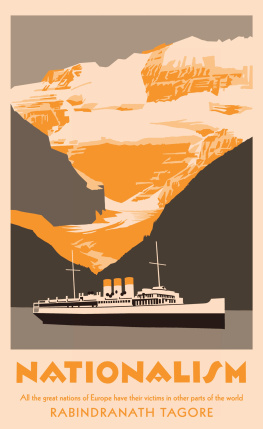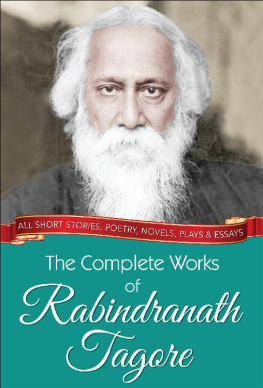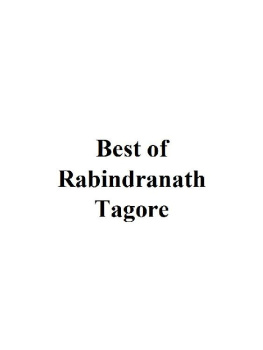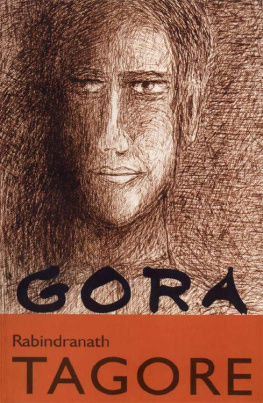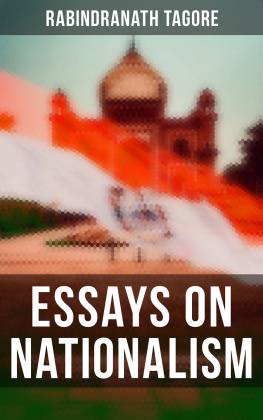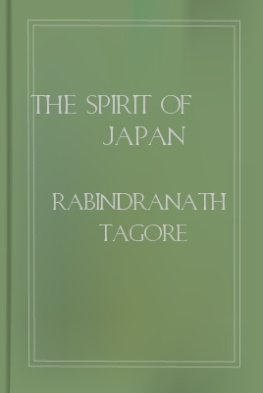Rabindranath Tagore - Nationalism
Here you can read online Rabindranath Tagore - Nationalism full text of the book (entire story) in english for free. Download pdf and epub, get meaning, cover and reviews about this ebook. year: 2010, publisher: Penguin Books Ltd, genre: Science. Description of the work, (preface) as well as reviews are available. Best literature library LitArk.com created for fans of good reading and offers a wide selection of genres:
Romance novel
Science fiction
Adventure
Detective
Science
History
Home and family
Prose
Art
Politics
Computer
Non-fiction
Religion
Business
Children
Humor
Choose a favorite category and find really read worthwhile books. Enjoy immersion in the world of imagination, feel the emotions of the characters or learn something new for yourself, make an fascinating discovery.
- Book:Nationalism
- Author:
- Publisher:Penguin Books Ltd
- Genre:
- Year:2010
- Rating:5 / 5
- Favourites:Add to favourites
- Your mark:
- 100
- 1
- 2
- 3
- 4
- 5
Nationalism: summary, description and annotation
We offer to read an annotation, description, summary or preface (depends on what the author of the book "Nationalism" wrote himself). If you haven't found the necessary information about the book — write in the comments, we will try to find it.
Nationalism — read online for free the complete book (whole text) full work
Below is the text of the book, divided by pages. System saving the place of the last page read, allows you to conveniently read the book "Nationalism" online for free, without having to search again every time where you left off. Put a bookmark, and you can go to the page where you finished reading at any time.
Font size:
Interval:
Bookmark:
Rabindranath Tagore
18611941
Rabindranath Tagore
PENGUIN BOOKS GREAT IDEAS
PENGUIN BOOKS
Published by the Penguin Group
Penguin Books Ltd, 80 Strand, London WC2R 0RL , England
Penguin Group (USA) Inc., 375 Hudson Street, New York, New York 10014, USA
Penguin Group (Canada), 90 Eglinton Avenue East, Suite 700, Toronto, Ontario, Canada M4P 2Y3 (a division of Pearson Penguin Canada Inc.)
Penguin Ireland, 25 St Stephens Green, Dublin 2, Ireland (a division of Penguin Books Ltd)
Penguin Group (Australia), 250 Camberwell Road, Camberwell, Victoria 3124, Australia
(a division of Pearson Australia Group Pty Ltd)
Penguin Books India Pvt Ltd, 11 Community Centre, Panchsheel Park, New Delhi 110 017, India
Penguin Group (NZ), 67 Apollo Drive, Rosedale, North Shore 0632, New Zealand
(a division of Pearson New Zealand Ltd)
Penguin Books (South Africa) (Pty) Ltd, 24 Sturdee Avenue, Rosebank, Johannesburg 2196, South Africa
Penguin Books Ltd, Registered Offices: 80 Strand, London WC2R 0RL , England
www.penguin.com
First published 1917
This selection published in Penguin Books 2010
All rights reserved
Except in the United States of America, this book is sold subject to the condition that it shall not, by way of trade or otherwise, be lent, re-sold, hired out, or otherwise circulated without the publishers prior consent in any form of binding or cover other than that in which it is published and without a similar condition including this condition being imposed on the subsequent purchaser
ISBN: 978-0-14-195722-7
The worst form of bondage is the bondage of dejection, which keeps men hopelessly chained in loss of faith in themselves. We have been repeatedly told, with some justification, that Asia lives in the past it is like a rich mausoleum which displays all its magnificence in trying to immortalize the dead. It was said of Asia that it could never move in the path of progress, its face was so inevitably turned backwards. We accepted this accusation, and came to believe it. In India, I know, a large section of our educated community, grown tired of feeling the humiliation of this charge against us, is trying with all its resources of self-deception to turn it into a matter of boasting. But boasting is only a masked shame, it does not truly believe in itself.
When things stood still like this, and we in Asia hypnotized ourselves into the belief that it could never by any possibility be otherwise, Japan rose from her dreams, and in giant strides left centuries of inaction behind, overtaking the present time in its foremost achievement. This has broken the spell under which we lay in torpor for ages, taking it to be the normal condition of certain races living in certain geographical limits. We forgot that in Asia great kingdoms were founded, philosophy, science, arts and literatures flourished, and all the great religions of the world had their cradles. Therefore it cannot be said that there is anything inherent in the soil and climate of Asia to produce mental inactivity and to atrophy the faculties which impel men to go forward. For centuries we did hold torches of civilization in the East when the West slumbered in darkness, and that could never be the sign of sluggish minds or narrowness of vision.
Then fell the darkness of night upon all the lands of the East. The current of time seemed to stop at once, and Asia ceased to take any new food, feeding upon its own past, which is really feeding upon itself. The stillness seemed like death, and the great voice was silenced which sent forth messages of eternal truth that have saved mans life from pollution for generations, like the ocean of air that keeps the earth sweet, ever cleansing its impurities.
But life has its sleep, its periods of inactivity, when it loses its movements, takes no new food, living upon its past storage. Then it grows helpless, its muscles relaxed, and it easily lends itself to be jeered at for its stupor. In the rhythm of life, pauses there must be for the renewal of life. Life in its activity is ever spending itself, burning all its fuel. This extravagance cannot go on indefinitely, but is always followed by a passive stage, when all expenditure is stopped and all adventures abandoned in favour of rest and slow recuperation.
The tendency of the mind is economical: it loves to form habits and move in grooves which save it the trouble of thinking anew at each of its steps. Ideals once formed make the mind lazy. It becomes afraid to risk its acquisitions in fresh endeavours. It tries to enjoy complete security by shutting up its belongings behind fortifications of habits. But this is really shutting oneself up from the fullest enjoyment of ones own possessions. It is miserliness. The living ideals must not lose their touch with the growing and changing life. Their real freedom is not within the boundaries of security, but on the high-road of adventures, full of the risk of new experiences.
One morning the whole world looked up in surprise when Japan broke through her walls of old habits in a night and came out triumphant. It was done in such an incredibly short time that it seemed like a change of dress and not like the building up of a new structure. She showed the confident strength of maturity, and the freshness and infinite potentiality of new life at the same moment. The fear was entertained that it was a mere freak of history, a childs game of Time, the blowing up of a soap-bubble, perfect in its rondure and colouring, hollow in its heart and without substance. But Japan has proved conclusively that this sudden revealment of her power is not a short-lived wonder, a chance product of time and tide, thrown up from the depth of obscurity to be swept away the next moment into a sea of oblivion.
The truth is that Japan is old and new at the same time. She has her legacy of ancient culture from the East the culture that enjoins man to look for his true wealth and power in his inner soul, the culture that gives self-possession in the face of loss and danger, self-sacrifice without counting the cost or hoping for gain, defiance of death, acceptance of countless social obligations that we owe to men as social beings. In a word, modern Japan has come out of the immemorial East like a lotus blossoming in easy grace, all the while keeping its firm hold upon the profound depth from which it has sprung.
And Japan, the child of the Ancient East, has also fearlessly claimed all the gifts of the modern age for herself. She has shown her bold spirit in breaking through the confinements of habits, useless accumulations of the lazy mind, which seeks safety in its thrift and its locks and keys. Thus she has come in contact with the living time and has accepted with eagerness and aptitude the responsibilities of modern civilization.
This it is which has given heart to the rest of Asia. We have seen that the life and the strength are there in us; only the dead crust has to be removed. We have seen that taking shelter in the dead is death itself, and only taking all the risk of life to the fullest extent is living.
I, for myself, cannot believe that Japan has become what she is by imitating the West. We cannot imitate life, we cannot simulate strength for long, nay, what is more, a mere imitation is a source of weakness. For it hampers our true nature; it is always in our way. It is like dressing our skeleton with another mans skin, giving rise to eternal feuds between the skin and the bones at every movement.
The real truth is that science is not mans nature, it is mere knowledge and training. By knowing the laws of the material universe you do not change your deeper humanity. You can borrow knowledge from others, but you cannot borrow temperament.
Next pageFont size:
Interval:
Bookmark:
Similar books «Nationalism»
Look at similar books to Nationalism. We have selected literature similar in name and meaning in the hope of providing readers with more options to find new, interesting, not yet read works.
Discussion, reviews of the book Nationalism and just readers' own opinions. Leave your comments, write what you think about the work, its meaning or the main characters. Specify what exactly you liked and what you didn't like, and why you think so.

